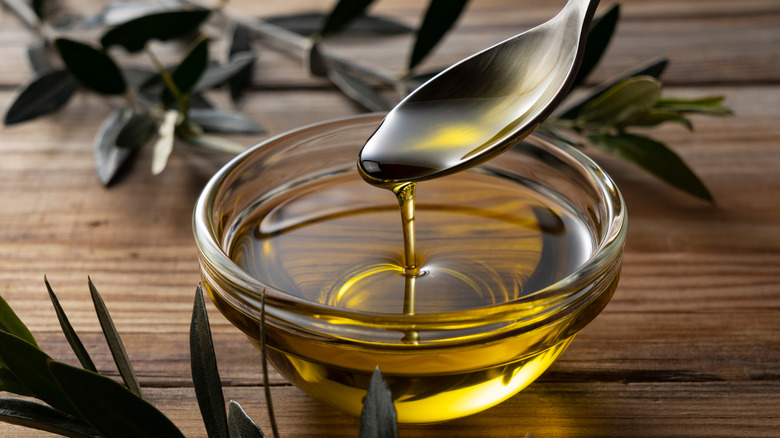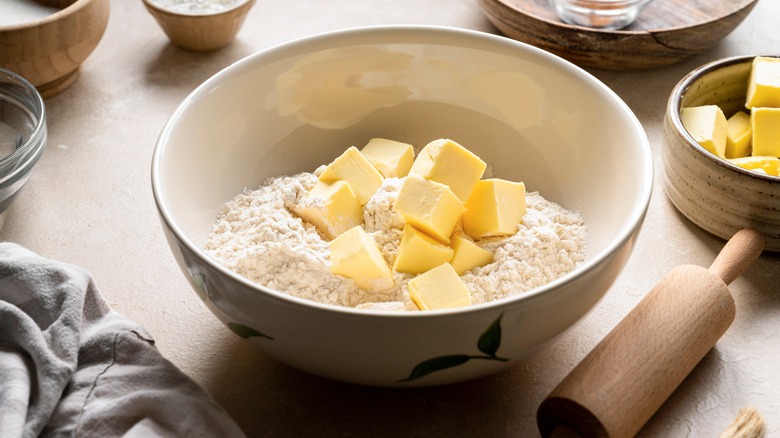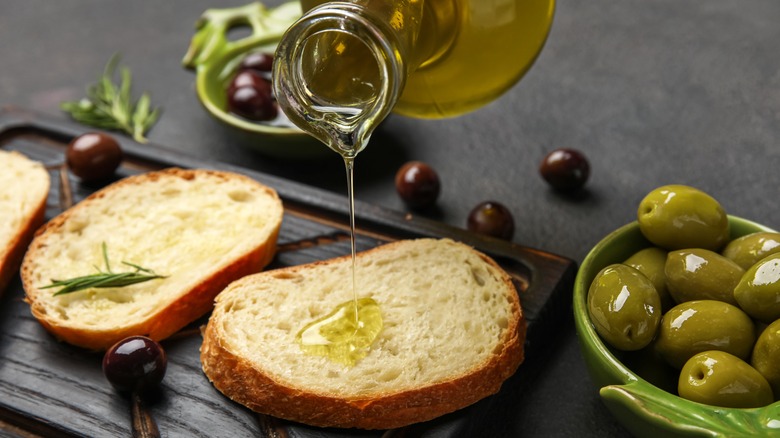The Ratio Tip You Need To Swap Olive Oil And Butter In Recipes
There are countless reasons why you may want to swap butter with olive oil in your recipes. Maybe you've run out of the dairy staple and need the next best cooking fat in its place, or perhaps it's olive oil's purported anti-inflammatory benefits that may support heart health and lower the risk of cancer that steer your choice. It could even be the fact that subbing in olive oil may be able to add a few more years to your lifespan as pointed out by a 2022 study published in the Journal of the American College of Cardiology.
No matter the reason, it also surely helps that just about anything that you can cook or bake with butter can be prepared using olive oil as well — as long as you know how to substitute it properly. Replacing butter with olive oil is easier in cooking than baking and can generally be applied using a 1:1 ratio. For baking purposes, the swap will generally require a lower measurement of olive oil than butter, so a good rule of thumb to follow here is a 3:4 ratio — that is, use three parts of olive oil for every four parts of butter needed. So if a recipe calls for a cup of butter, you'd need 3/4-cup of olive oil, and if it asks for a 3/4-cup of butter, 1/2-cup of olive oil plus a tablespoon on top should do the job.
Tips for substituting butter with olive oil when baking
Although olive oil is a relatively easy swap for butter, there are a few things to keep in mind when doing so in baked recipes. Baking can be an awful lot like science where each ingredient works with others in a chemical reaction, so before you go ahead and make changes to the equation, it's important to know butter's role first.
For example, items like pound cakes get their delicate structure from air pockets created by creaming butter and sugar together, so they're not going to do well with another fat. When butter is swapped with olive oil, that tender and fluffy texture may turn into a denser feel instead.
Another tip: Butter is much easier to swap with olive oil in a recipe where the former is used in melted form — think cookies and brownies. But, if you must substitute butter in a recipe where it's whipped into a cream, it may be wiser in this case to only substitute half of the butter with olive oil rather than remove all of it. It's also important to note that butter promotes more browning than olive oil so when swapped, you may not get the same deep golden hue out of your bakes. You may also want to account for the fact that olive oil has more flavor than neutral-tasting butter, so it's best to use delicate oils that have more buttery notes than bitter ones.
Olive oil may be the better option when cooking
Swapping butter for olive oil is far easier in cooking applications than baking and can be done generally in equal proportions. In some cases, olive oil may even be a better fat to cook with, especially considering its smoke point. While butter starts smoking at 350 degrees Fahrenheit, olive oil's smoke point of 470 degrees Fahrenheit is significantly higher. Not only is it relatively stable at high temperatures, but unrefined olive oil does not break down into harmful compounds under high heat either. So if you're sauteeing, searing, or even pan-frying, olive oil may actually work out to be the better option.
That said, olive oil can be pricier, especially considering it should be used in equal proportions to butter for cooking. The more expensive extra virgin varieties may be better left for finishing dishes whereas less pricey options can be more suitable for high-heat cooking that may require a higher quantity of fat.
Another thing to note is that olives impart flavors in olive oils that are as important in cooking as they are in baking, and they can either elevate a dish or leave an undesired aftertaste depending on how well you pair them. Spicy and peppery olive oils are better suited for soups, stews, and pasta whereas bitter and grassy ones work fabulously with breads, red meats, and equally bitter greens. Pair them properly and you may find that there are more advantages when substituting butter with olive oil.



